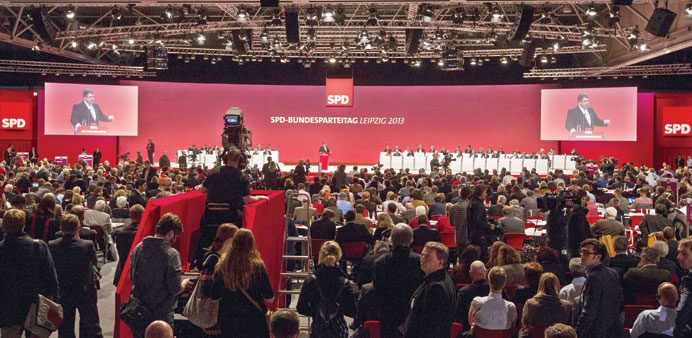AFP/Leipzig
Germany’s Social Democrats chief Sigmar Gabriel called yesterday on the rank-and-file to back plans to team up in government with Chancellor Angela Merkel’s conservatives, pledging not to accept “rotten compromises”.
Three weeks into talks on a left-right tie-up, Gabriel, 54, cautioned that any future coalition deal would not include all the Social Democratic Party’s (SPD) demands but it could still make a difference to people’s lives.
He sought to reassure some 600 delegates at a congress in the eastern city of Leipzig, after the SPD’s second worst general election result in September, that the party was not headed for a repeat of its previous grand coalition with Merkel.
“The SPD can achieve a lot for people in Germany in these coalition negotiations. But it must not play all or nothing,” said Gabriel, who would likely ascend to be Merkel’s vice-chancellor in a coalition government.
He said anyone expecting “100% of the SPD election manifesto” to be included in a coalition deal “expects too much” but added: “We will only accept good and not any rotten compromises.”
An 8.50-euro/hour ($11) national minimum wage is a must for the SPD, he said.
However, he also eyed other policies such as creating a fairer labour market, fighting old-age poverty, more investment for training and infrastructure and more equality for same-sex couples.
Amid scepticism among SPD members, the party has been wrangling with Merkel’s Christian Democratic Union (CDU) and its CSU Bavarian allies on forming a grand coalition following September elections.
With a deadline looming, an overall deal remains elusive despite a handful of agreements having been hammered out, including on European policy and rent control in some cities.
SPD general secretary Andrea Nahles warned yesterday of “still almost insurmountable” differences on some areas.
She stressed in yesterday’s Frankfurter Rundschau newspaper that both sides wanted a deal “but we still have a fair stretch ahead of us”.
The Leipzig congress was to provide Gabriel, who is due to be re-elected head of the party later, a last chance to rally the troops before the party base is due to vote on any coalition deal reached from December 6.
With disappointment over the party’s last left-right partnership with Merkel in 2005-09 still fresh in many SPD minds, Gabriel has vowed to give the 470,000-strong membership the final say on joining another grand coalition.
Amid large placards urging members to participate in the vote, Nahles was first up to address the congress, driving home the importance of the democratic process of delegates themselves deciding the party’s future course.
“It’s about people engaging,” she said to enthusiastic applause.
SPD member Oliver Urban, 46, a lawyer from Borna near Leipzig, said that he expected a “yes” vote from members eventually, despite sensing opposition currently.
“Today my gut feeling is that people in my constituency are more for ‘no’. What’s important for us is east-west pension adjustment,” he told AFP, referring to the lower rate paid to seniors in the former communist regions of the country.
Student Sebastian Fiedler, 25, from Kassel, described the members’ vote as a “super idea” but said he did not know yet which way he would vote.
“It depends on the coalition agreement,” he said.
The SPD is also set to vote on a motion that would open the door to a possible coalition with the far-left Linke party in future, an alliance the SPD has long rejected, considering the Linke, with roots in East German communism, too extreme.
Political scientist Ulrich von Alemann, of Duesseldorf University, told AFP that the move targeted both reluctant SPD members and Merkel herself.
“It’s a sign to the (party) base showing that in the long term there are other solutions, and also to Mrs Merkel, to warn her that the SPD can also act differently,” von Alemann said.

Gabriel speaks on stage during the SPD party congress in Leipzig.
